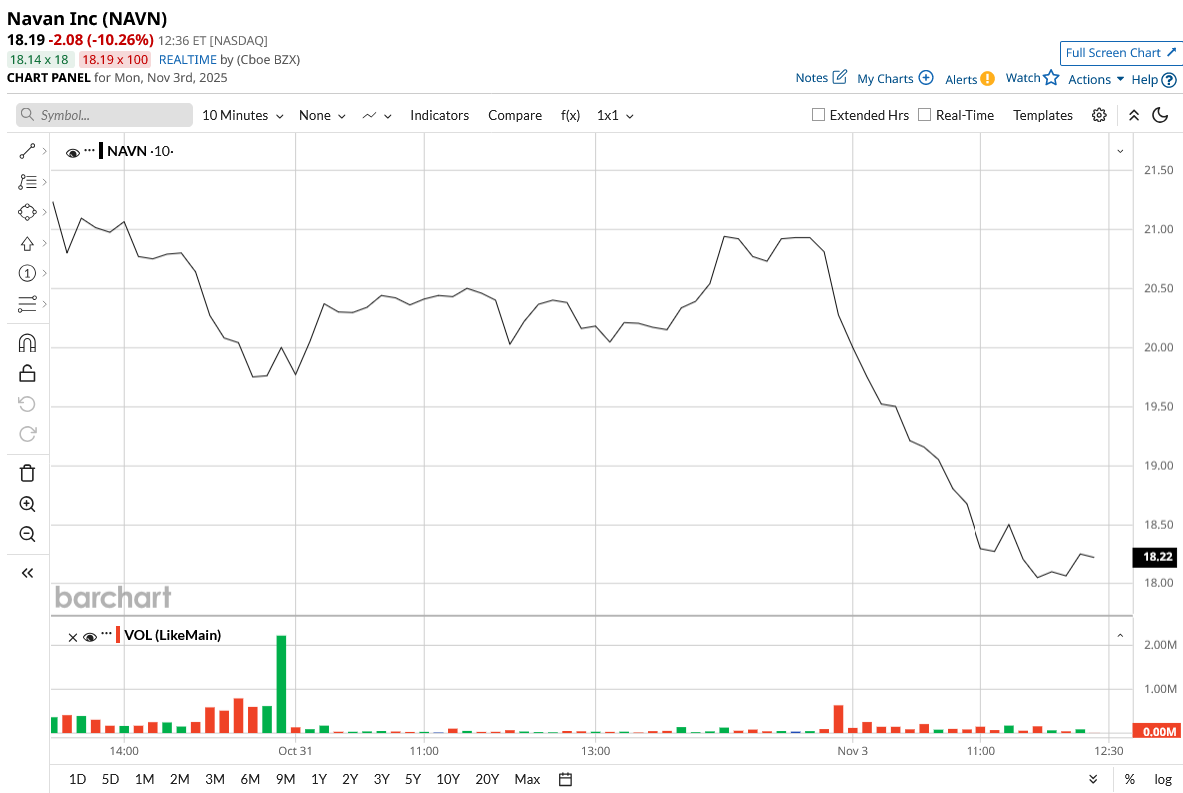It has been a hot year for IPOs, with companies from the fintech and crypto industries being the foremost names that have opted to go for the public route. As such, Navan's (NAVN) IPO on Thursday, Oct. 30, has grabbed attention.
About Navan
Founded in 2015 as TripActions and rebranded to Navan in 2023, the company offers an integrated platform for corporate travel management, expense management, and payments/corporate cards, all in one “super-app” for business travelers, travel managers, and finance teams. Its business model comprises usage-based fees from travel services and subscription fees from its expense management software. It also captures payment volume via its corporate card/payments offering.
Navan was looking to raise about $960 million by offering about 37 million shares at a price band of $24 to $26, implying a valuation of roughly $6.45 billion. Eventually, Navan (trading under the ticker NAVN) raised about $923 million, and its shares opened at $22, which was a 12% discount to the midpoint of the price range.
Now, with the listing out of the way, is Navan a viable investment bet? Let's analyze.

Financials: Same IPO-Bound Story
Navan's financials follow a similar pattern as other standard IPO-bound companies: rising revenues, unprofitable but with shrinking losses, and improvement in some key metrics, with cash levels lower than its debt.
For the fiscal year ended January 31, 2025, revenues increased to $536.8 million from $402.3 million in the previous year. This was mirrored in the first six months of 2025 (ended July 31), with revenues of $329.4 million, up 29.8% from the year-ago period.
Loss from operations for FY 2025 was lower at $107.6 million compared to $246.3 million in FY 2024, and for the six months ended July 31, 2025, it was $28.2 million, lower than the previous year's figure of $55.4 million. Overall, net loss attributable to shareholders shrank by an encouraging 46.2% in FY 2025 to $4 per share. However, for the first six months of 2025, it expanded to $2.15 per share from $2.05 per share, an unpleasant yet not-so-alarming development.
Although the company remains profitable at the gross level, it has yet to be profitable at the operational level, although the losses are certainly narrowing. Thus, instead of shooting for the bottom line, Navan should take a slow and steady approach and turn profitable at the operational level, as it will validate that the company can carry out its core business profitably.
To that end, improvement in the key operational metrics of gross booking volume and payment volume will only help. In FY 2025, gross booking volume (GBV) witnessed a substantial yearly jump of 32% to $6.6 billion as payment volume increased to $3.7 billion from $2.7 billion in the prior year. For the first six months of 2025, the GBV increased by 32.3% yearly to $4.1 billion, and payment volume rose by 11.1% in the same period to $2 billion.
Finally, ending the financials by poring over its cash and debt position, Navan's cash balance as of July 31 stood at $223.2 million, while its long-term debt levels were much higher at $658.2 million.
Can Navan Make It A Happy Journey For Its Investors?
The market in which Navan operates is undoubtedly an exciting one, although it remains highly vulnerable to the vagaries of the economy and discretionary spending by enterprises. Nevertheless, the market is projected to reach $2.9 trillion by 2029 as corporate travel remains less susceptible to economic downturns than the general public.
Notably, a core pillar of the company's expansion plan involves sticking with its "land and expand" model to deepen penetration among current clients, capture more of their spending, broaden its global reach, and pour resources into enhancing its core platform and services. This is where Navan pulls ahead of rivals such as SAP Concur, Egencia, and TravelPerk: it delivers a genuine unified solution that bundles travel booking, expense tracking, and payment processing (including corporate cards) into a single interface, easing the headaches of data matching and third-party tie-ins.
Moreover, Navan is leaning into proactive artificial intelligence (AI) via its Ava virtual assistant, which goes beyond mere suggestions to handle tasks like itinerary adjustments, expense sorting, and compliance checks automatically, potentially slashing overhead for corporate travel operations.
Unsurprisingly, then, user feedback routinely highlights Navan's intuitive booking interface and higher traveler approval ratings as clear wins over older, clunkier legacy setups.
That said, headwinds linger, including the potential shake-up from broader generative AI tools. Navan also carries exposure from its narrow emphasis on travel management, though executives have signaled plans to venture into related areas to diversify.
Parting Thoughts
Navan's share price performance post-listing has been dismal. Moreover, the wider economic picture may also not look that conducive to Navan's operations. However, Navan's differentiated offerings, AI-first platform, and intuitive user experience, along with improving financials, make the company's stock an interesting way to gain exposure to the travel sector. In fact, if Navan continues on its path of financial improvement and is not a victim of innovation inertia like legacy players, it has the potential to disrupt the travel industry.
Thus, investors, at this price point, can opt to take a flyer on Navan with a limited amount and see where it takes them.
On the date of publication, Pathikrit Bose did not have (either directly or indirectly) positions in any of the securities mentioned in this article. All information and data in this article is solely for informational purposes. For more information please view the Barchart Disclosure Policy here.
